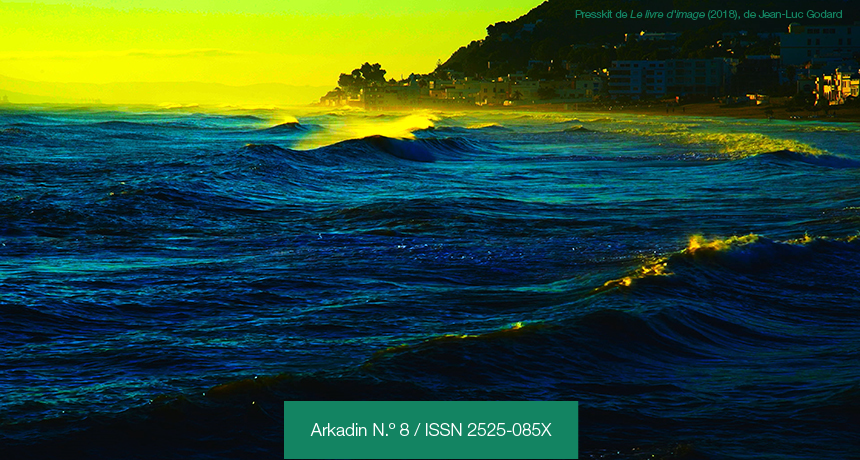Recover the Instant, To See Through the Images
DOI:
https://doi.org/10.24215/2525085Xe001Keywords:
Progress, instant, desire, memory, imageAbstract
The formal reason for the audiovisual essay is not exclusively aesthetic but is rooted in a daily context that should be examined in its most compromising implications. From the criticism of progress, the article reflects on the echoes of that alienating culture and how to reverse them in favor of the subject not being disabled but available to rebuild, to create a way of living time and a way of seeing, in the middle of the repetitive time of consumption.References
Beauvoir, S. de (1967). La mujer rota. Barcelona, España: Edhasa.
Benjamin, W. (1971). Angelus Novus. Barcelona, España: Edhasa.
Benjamin, W. (1989). Discursos interrumpidos, I. Ciudad Autónoma de Buenos Aires, Argentina: Taurus.
Benjamin, W. (1998). Imaginación y Sociedad, Iluminaciones I. Madrid, España: Taurus.
Benjamin, W. (2001). Para una crítica de la violencia y otros ensayos, Iluminaciones IV. Madrid, España: Taurus.
Benjamin, W. (2004a). Sobre la fotografía. Valencia, España: Pre-textos.
Benjamin, W. (2004b). Libro de los Pasajes. Madrid, España: Ediciones Akal.
Benjamin, W. (2005). La dialéctica en suspenso. Fragmentos sobre la historia. Santiago de Chile, Chile: Lom.
Deleuze, G. (1967). Sur la volonté de puissance et l’éternel retour [Sobre la voluntad de poder y el eterno retorno]. En G. Deleuze (Comp.), Nietzsche. Colloque de Royaumont [Nietzsche. Coloquio de Royaumont] (pp. 275-287). París, Francia: Les Éditions de Minuit.
Deleuze, G. (1995). Proust y los signos. Barcelona, España: Anagrama.
Deleuze, G. (2011). Lógica del sentido. Barcelona, España: Paidós.
Godard, J. L. (Director). (2004). Notre Musique [Película]. Francia: Avventura Films et al.
Marinas, J. M. (2014). Ética de lo inconsciente. Comunidad y psicoanálisis. Madrid, España: Biblioteca Nueva.
Marker, C. (Director). (1983). Sans Soleil [Película]. Francia: Argos Films.
Martínez Ahrens, J. (10 de marzo de 2018). La gente ya no cree en los hechos. El país. Recuperado de https://elpais.com/cultura/2018/03/06/babelia/1520352987_936609.html
Nietzsche, F. (1999). Sobre el perjuicio y la utilidad de la historia para la vida. Madrid, España: Biblioteca Nueva.
Oyarzún, P. (2005). Cuatro señas sobre experiencia, historia y facticidad. A manera de introducción. En W. Benjamin, La dialéctica en suspenso. Fragmentos sobre la historia (pp. 5-44). Santiago de Chile, Chile: Lom.
Sontag, S. (2006). Sobre la fotografía. Ciudad de México, México: Alfaguara.
Valéry, P. (1934). La conquête de l’ubiquité [La conquista de la ubicuidad]. En Pièces sur l’art. París, Francia: Gallimard.
Downloads
Published
How to Cite
Issue
Section
License
The acceptance of the manuscript by the magazine means the non-exclusive cession of the property rights of the authors in favour of the editor, who allows the reuse, after publication (post print), under a license Attribution-NonCommercial-NoDerivatives 4.0 International.
According to these terms, the material can be copied and redistributed by any means or in any format as long as a) the author and original source of the publication are quoted (magazine and URL of the work), access to the license is provided and whether changes have been made is mentioned; and b) the material is not used for commercial purposes.
The cession of non-exclusive rights means that after the publication (post print) in Arkadin the authors can publish their work in any language, means and format; in such cases it must be mentioned that the material was originally published in this magazine. Such cession also means the authorization of the authors for the work to be collected by SEDICI, the institutional archive of the Universidad Nacional de La Plata, and to be spread in the databases that the editorial team considers appropriate to increase the visibility of the publication and its authors.
Moreover, the magazine encourages the authors to deposit their productions in other institutional and thematic archives under the principle that offering the society the scientific and academic production without any restrictions contributes to a greater exchange of the global knowledge.
























